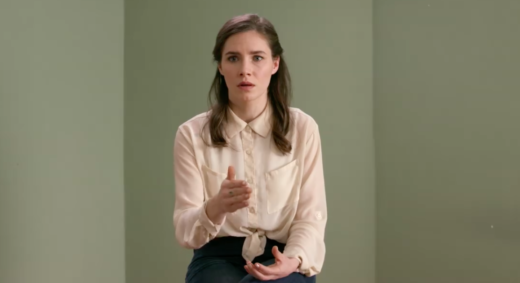Knox's first guest was Anita Sarkeesian: the center of Gamergate, and a woman who received so many rape and death threats after speaking out about misogyny and objectification in video games, she was forced to flee her own home. Many gamers remain suspicious of Sarkeesian and her perceived infractions against the community.
There are a multitude of blogs and YouTube videos still dedicated to bashing Sarkeesian. On The Scarlet Letter Reports' own Facebook page, one man left a comment saying "I can’t believe Amanda Knox would put her and Anita on the same level. Anita has never been a real victim at all…"
The fact that Amanda Knox is hosting the series speaks volumes about The Scarlet Letter Reports' intentions. Despite a lack of evidence, and her 2015 acquittal, there are people all over the world still laboring under the assumption that Knox had a hand in the horrific 2007 murder of her roommate, Meredith Kercher. Netflix documentary Amanda Knox helped some understand just what had happened to this woman at the hands of a salacious tabloid press, but misinformation about her character has continued to persist.
Print media wasn't just a nightmare for Knox during her trial, it didn't let up during her appeal either. Even one of the more reputable newspapers in the UK, The Telegraph, published a story in 2011 titled "Five Reasons Knox is Guilty." The tabloids may finally have moved on in 2018, but they made such a huge impact initially, that many have found those accusations hard to forget.
In a Debate.org poll titled "Is Amanda Knox guilty?" 71% voted yes. As with Sarkeesian, YouTube continues to be awash with new-ish videos about her case, titled things like "Was Amanda Knox really guilty?"; "11 Lies in the Amanda Knox Documentary"; "Amanda Knox: the facts against her."
Even when E! News called Knox's case "shockingly misogynistic" in 2016, the outlet still felt it appropriate to accompany the piece with a Nancy Grace video interview, in which the outspoken legal commentator said:
"You know what I loved about the Amanda Knox case? That she, like OJ Simpson, had a dream—as if she were clairvoyant. Amanda Knox dreamed of the moment her roommate was murdered. And she dreamed that she was right there in the apartment when it happened. Now, isn’t that a co-inn-kee-dink?"
Make no mistake: The selection of Knox to host a show about the public shaming of complicated women is both a carefully considered and extremely bold one. The fact that Knox lost four years of her life to an Italian prison sets an appropriately serious tone for the series, one that is frequently missing when these women are being publicly scrutinized and dismissed online. Knox's presence allows her guests to open up, safe in the knowledge that the person they're talking to understands exactly what they have gone through. When you've been judged in such a harsh and prolonged way as Amanda Knox has, there's no way you're going to judge other vilified women, so the guests are given the rare opportunity to present themselves as the full human beings that they are.
Prior to #MeToo prompting a broad swell of empathy, none of these women could or would have been given this kind of platform. These are women who have been marginalized and judged because of an unfair focus on their imperfections. The Scarlet Letter Reports is stretching the #MeToo conversation beyond sexual assault and harassment to effectively demonstrate how women—especially ones that end up in the spotlight for reasons they never could have anticipated—can also be victimized in a multitude of other ways. It is an important reminder that you don't have to be in the same room as a bad guy to be subjected to abuse.
Knox, Sarkeesian, Rose, Barton, Rossi, and Coleman have all had their lives irretrievably altered by judgmental misogyny. Each of them, Knox notes in one episode, has "been rendered two-dimensional" by the public and/or media. Most importantly though, each of them has taken those experiences and attempted to transform them into something constructive. Allowing them to share their truths isn't just valuable, it's an acknowledgement of a dark and looming thread that unites pockets of largely unheard women all over the country. Doing so finally allows publicly maligned women to say "Me Too" too.


